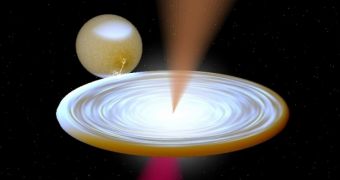SRON Netherlands Institute for Space Research astronomers argue in a new study that black holes can switch between gears just like a car does, depending on the rates at which it converts matter falling through the event horizon into energy emanating from its poles.
The fact that accretion disks around the Universe's most massive black holes channel matter through their event horizon is no secret, but very few people know that black holes also produce stuff. They release very strong radiation jets in plumes from their poles. The phenomenon puzzles researchers.
In effect, these structures appear to be acting like very large matter converters. Granted, not all matter is turned into radiation and energy, since some of the material falling through the event horizon goes on to fuel the black holes itself, allowing it to grow.
Over the years, astronomers were puzzled to observe that not all black holes were conducting this conversion process in the same manner. The SRON team set out to investigate why that was.
Researchers studied two black holes, and noticed how the objects can switch between two conversion regimes, essentially changing gears in terms of activity. Details of the work will appear in two upcoming papers, to be published in the journal Monthly Notices of the Royal Astronomical Society.
“We found that these two black holes could also 'change gear', demonstrating that this is not an exceptional property of one peculiar black hole. Our work suggests that changing gear might be common among black holes,” SRON PhD student Eva Ratti explains.
“We also found that the switch between gears happens at a similar X-ray luminosity for all the three black holes,” adds the expert, who led the work with expert and study team leader, Peter Jonker.
The group used the NASA Chandra X-ray Observatory for this job. The observations were augmented with data from the Expanded Very Large Array, in New Mexico. These telescopes were critical for the success of the study.
Due to their intense gravitational pull, black holes consume even light, which means that astronomers will never be able to study them directly. However, studying radiation given off by their accretion disks and light plumes can reveal important data on their activity.

 14 DAY TRIAL //
14 DAY TRIAL //